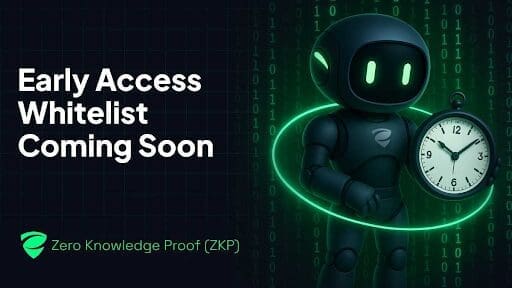In the realm of Zero Knowledge Proof (ZKP), value isn’t awarded to the loudest voice or the deepest wallet; it’s assigned to those who can read between the lines. The protocol doesn’t wait for exchange listings or token mechanics to determine community worth.
Instead, its whitelist phase filters the crowd based on something often overlooked in early-stage crypto projects: discernment. With the spotlight now on interpretation rather than speculation, the Zero Knowledge Proof blockchain model shifts the expectations from how much one holds to how clearly one can think.

This first phase is not about collecting wallets; it’s about identifying evaluators. Zero Knowledge Proof (ZKP) is making a definitive move away from the typical presale format, where hype and hype-followers dominate early access. Instead, the protocol is treating the whitelist as a strategic filtration layer, designed to identify individuals who don’t just want to participate; they want to evaluate meaning. That foundation sets the tone for a protocol that is structured not to amplify noise, but to build a system of trusted inputs, curated by a merit-based layer of contributors.
Whitelist as a Meritocratic Filter
Zero Knowledge Proof (ZKP) introduces a new kind of onboarding: one where your judgment is your application. Unlike other crypto presales that emphasize speed, social reach, or financial contribution, the ZKP blockchain model asks its earliest contributors for clarity. Clarity of thought. Clarity of interpretation. Clarity of what should or should not be elevated within the protocol.
The whitelist isn’t just early access, it’s a proving ground. Those who join are not passive waitlisters; they are the first interpreters. Their role is to demonstrate how well they understand the protocol’s architecture, mission, and model. The ZKP verifier system uses these early interpretations to identify future contributors who can assign value, not based on market momentum, but based on the interpretive worth of content, claims, and propositions made within the system.
In this light, being accepted to the whitelist becomes the first badge of merit. It’s the entry point into a structure that rewards judgment over accumulation. The whitelist is not just a list; it’s a gateway to protocol trust.

The Auction Needs Interpreters, Not Speculators
Zero Knowledge Proof (ZKP) is not designed to function like other Layer 1s that rely on resource-intensive consensus or speculative interest alone. Its auction system is calibrated around trustworthy verification. At the center of that design is the ZKP verifier, a role requiring far more than transactional approval. Here, verification means interpretation. It means reading a claim and assigning it semantic value based on logic, coherence, and alignment with protocol goals.
This framework simply doesn’t work if early contributors treat the whitelist like a lottery ticket. It works if they treat it like an audition. An early test. A selective gate that admits only those with the intellectual discipline to think clearly and assess critically. It’s why the Zero Knowledge Proof (ZKP) blockchain model doesn’t advertise early whitelist perks with the usual fanfare. Instead, it’s drawing attention to the opportunity to curate, a rare framing in a space that often sidelines intellectual engagement.
Those accepted onto the whitelist will be asked to participate in ZKP’s unique verification flows, submitting judgments on which content holds protocol-level importance. That feedback loop builds the very auction model ZKP intends to use for assigning value across its chain. If the protocol must choose between amplifying hype or amplifying sense-making, it chooses the latter.
Clarity Over Capital: A New Crypto Entry Standard
The whitepaper makes it clear: Zero Knowledge Proof (ZKP) is not just attempting to decentralize trust, but to reallocate influence. This starts by rejecting the capital-first default in favor of an interpretation-first model. The whitelist is where this pivot becomes visible. Instead of competing to buy in, contributors are invited to think their way in. And for those asking what a knowledge proof is without clarity, this system offers a confident answer: nothing.
While other upcoming crypto presales center their marketing around tokenomics, price charts, and rapid exchange rollouts, ZKP frames the whitelist as the beginning of its governance layer. Interpretation becomes the onboarding ritual. The first metric isn’t volume. It’s judgment. That’s the credential that Zero Knowledge Proof (ZKP) seeks from its early adopters.
It is a model that prioritizes signal over noise, where each new contributor must show, not tell, their understanding of the protocol. This gives the whitelist process not just strategic weight, but symbolic weight. It’s a declaration that those shaping the foundation of the network are expected to do more than ride early gains. They’re expected to think critically and participate meaningfully.
Final Verdict: Whitelist Participation Is Reputation in Action
Zero Knowledge Proof (ZKP) isn’t asking who wants in. It’s asking who can help define value. Its whitelist doesn’t favor the fastest or the richest. It favors the clearest. This meritocratic design positions the protocol for long-term health, especially as its verifier system grows in influence. What begins with interpretation ends in governance. What starts as a whitelist becomes the foundation of a knowledge economy built on trusted human input.
For those scanning the top presale 2025 lists, looking for something that rewards clarity over clout, Zero Knowledge Proof (ZKP) offers an alternative to business as usual. It’s not just another upcoming crypto presale, it’s a filter. A chance to participate through reason, not reach. And while others chase trends, ZKP builds a model where interpretation itself is valued.
Find Out More About Zero Knowledge Proof (ZKP):
Website: zkp.com
